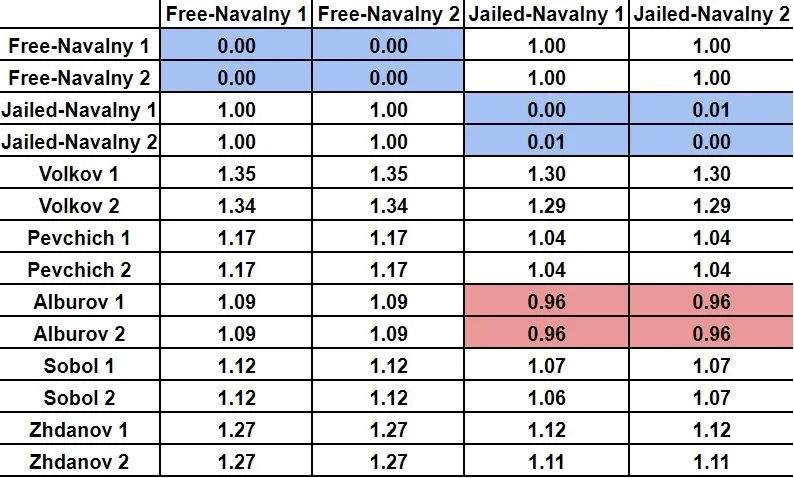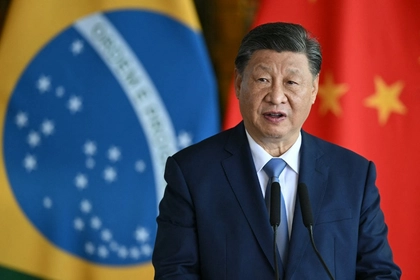Last week, after receiving another 19 years in prison, Russian opposition leader Alexei Navalny wrote a much discussed article, “Fear and Loathing,” describing who was to blame for the rise of the Putin regime. However, many have asked: Despite claims by Navalny’s Foundation Against Corruption (FBK) that Navalny writes his own texts, is it possible, given that his Foundation says he is a political prisoner and the government wishes to silence him, that his jailers would allow him to continue to get his message out to the public?
- Receive the latest Ukraine news bulletins for today.
- Find the latest Ukraine news published as of today.
In textual analysis, diction, grammar, use of conjunctions, and organization of spoken thoughts constitute a sort of “fingerprint.” Many people can be similar, but an exact copy is virtually impossible. To determine texts’ authorship, scientific researchers often contrast writing samples based on the widely scientifically accepted “Burroughs’ Delta,” created by computational stylistic founder John Burroughs, using programs such as the Stylo stylometric analysis package.
JOIN US ON TELEGRAM
Follow our coverage of the war on the @Kyivpost_official.
In academic research that will be published later this month in Ukraine, an analysis was conducted of Alexei Navalny’s writings before he was in prison compared to “his” writings “from prison,” to determine if the author was the same. To do this, we collected publicly available texts known to be written by free-Navalny versus texts attributed to jailed-Navalny, to be analyzed. As the research tools used are publicly available, others can repeat the experiment to confirm the findings.

Ukrainian Drones Hit Missile Arsenal, Key Russian Oil Facility in Russia’s Tver Region

First stage: Confirmation that the author of the texts of jailed-Navalny vs free-Navalny are different people. (Key: Number > 0, it is the same text; Number < 1, the same author composed the texts; Number > 1.5, different authors composed the texts.)
We then ran an analysis contrasting jailed-Navalny’s texts to several of the top FBK leaders (specifically: Leonid Volkov, Maria Pevchikh, Georgy Alburov, Lubov Sobol, and Ivan Zhdanov). The analysis showed that much of the FBK’s leadership uses similar writing, something that could be attributable to quoting each other, or the same texts, often. It also showed that there is likely a process for collective editing of texts. However, it does not lessen the key finding, that, with high statistical certitude: Jailed-Navalny is not composing his own texts – a ghostwriter is being used.
During the second stage of the experiment, we divided more texts and contrasted them further against the writings of Navalny from when he was in jail versus when he was a free man. This stage confirmed that Navalny is not writing his texts from prison and demonstrated that only one person fell below the threshold (of 1.0) to be the likely author: Georgy Alburov. However, this does not exclude the possibility that others in the FBK also assist in writing or editing “Navalny’s” prison texts.

Stage two: Confirmation that jailed-Navalny is not composing his own texts. Gregory Alburov, the only one to score below 1.0, is the most likely primary author. (Key: Number > 0, it is the same text; Number < 1, the same author composed the texts; Number > 1.5, different authors composed the texts.)
Our research’s conclusions:
1. With a high degree of statistical certitude, the texts attributed to jailed-Navalny, were not written by Navalny himself, but by a ghostwriter.
2. In contrasting the writings of jailed-Navalny to FBK’s officers, there is a strong likelihood that FBK member Georgy Alburov is the ghost author behind Navalny’s texts since he has been jailed. Though he could be assisted by others in the organization to edit or formulate the texts.
3. The differences between the various FBK employees are not large, indicating: a) The presence of a large number of frequent words common to all authors, which could indicate the use of common talking points; b) Quoting each other or the same sources; and c) The collective editing of many texts and frequent mutual quotations of each other. However, importantly: this does not cancel out the fact that stylometrically, the texts of Alburov and jailed-Navalny are closer than the texts of Alburov and free-Navalny, indicating that Alburov is most likely responsible for writing texts for Navalny when he is in jail.
So, the much-discussed piece that came out yesterday, “Fear and Loathing”: Did Navalny write it himself?
Our research has found that it was most likely written by the same person who has continually ghost written his pieces: Georgy Alburov. Is it surprising that Navalny is using a ghostwriter? No, and it is predictable given the circumstances.
Oleksiy Borovskiy, PhD, is a sociologist who taught at the Taras Shevchenko National University in Kyiv, Ukraine.
The views expressed in this opinion article are the author’s and not necessarily those of Kyiv Post.
You can also highlight the text and press Ctrl + Enter










